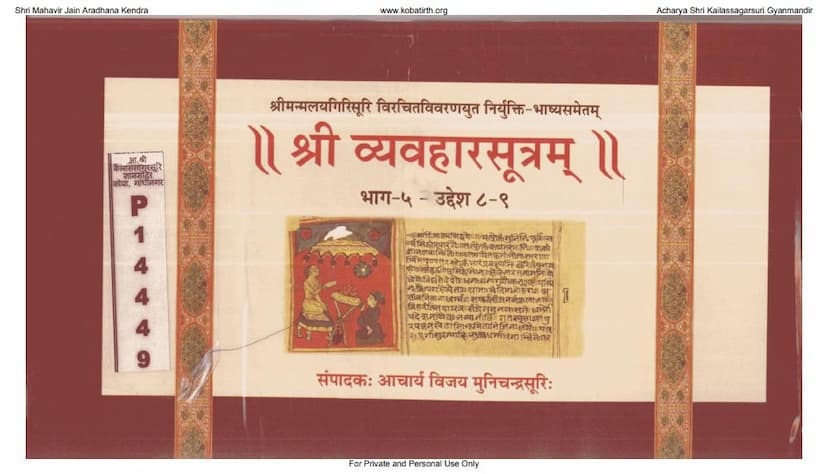Vyavahar Sutram Part 05
Added to library: September 2, 2025

Summary
This document is Part 05 of the Vyavahara Sutram, authored by Muni Chandrasuri, published by Omkarsuri Gyanmandir, Surat. It covers Chapters 8 and 9 of the text, with commentary and explanations by Shriman Malayagirisuri, and includes the Niryukti-Bhashya.
Key Contents of Part 05 (Chapters 8 & 9):
This volume focuses on the rules and conduct for Jain monks and nuns, specifically addressing:
-
Chapter 8 (Ashtam Uddeshak): This chapter primarily deals with Śayyāsaṁstāraka (bedding and seating arrangements) and the regulations surrounding their use, acquisition, and maintenance. It covers various aspects such as:
- Permissibility of taking bedding: When and under what conditions monks can accept or use bedding.
- Types of bedding: Discussing materials and their suitability.
- Regulations during different seasons: Specific rules for rainy seasons, winter, and summer.
- Procedures for acquiring bedding: How to ask for, receive, and use bedding, including rules about places and circumstances.
- Care and maintenance of bedding: Rules related to cleaning, repair, and proper handling.
- Rules for elderly and infirm monks: Special considerations for those who are weak or ill.
- Rules for abandoned or lost items: What to do with bedding found or left behind.
- Exceptions and specific conditions: Situations where normal rules might be relaxed or altered due to specific circumstances like illness, safety, or the needs of the community.
- Consequences of violating rules: Discussing penances or expiations for transgressions.
- Special considerations for different places: Rules that might vary based on whether the monks are within a village, outside, or in specific types of dwellings.
-
Chapter 9 (Navam Uddeshak): This chapter shifts focus to rules concerning alms (bhiksha) and the conduct related to receiving them from lay followers (sāgārikas). It details:
- Rules about accepting alms from specific households: Regulations concerning when and from whom monks can accept food.
- Prohibitions on accepting alms in certain situations: Identifying circumstances where receiving alms is forbidden.
- Conditions for accepting alms from householders: Rules about the state of the household, the food offered, and the relationship with the donor.
- Rules concerning different types of donors: Distinguishing between those who willingly offer and those who offer under certain conditions.
- Specific rules for shared kitchens or facilities: Regulations for monks using common resources.
- The concept of Sādhāraṇa (common) and Nissādhāraṇa (uncommon) practices: Understanding how these concepts apply to food and its acceptance.
- Rules regarding the use of specific utensils or food items: Discussing what is permissible and what is not.
- The importance of proper conduct and intention: Emphasizing the purity of intention and action in alms-seeking.
- The significance of mōka pratima (a specific devotional practice): The text describes different types and the regulations associated with performing this practice.
- Rules regarding datti (offerings) and their quantity: How to receive and manage offerings.
- The concept of upahṛta (collected/received items) and avagr̥hīta (taken/held items): Differentiating and outlining rules for these.
Overall Significance:
The Vyavahara Sutram is a foundational text in Jainism, particularly for the monastic community. This part, focusing on Chapters 8 and 9, provides detailed ethical and practical guidelines essential for monks and nuns to maintain their vows and conduct themselves appropriately in their daily lives, interactions with lay followers, and during their ascetic practices. The commentary by Malayagirisuri further elucidates these complex rules, making them accessible for study and practice.